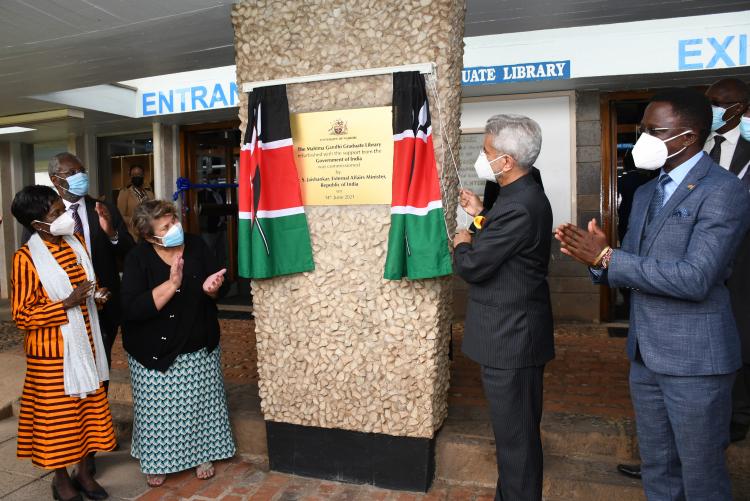At a colourful ceremony held on the 14th of June, 2021 at the University of Nairobi’s main campus, the External Affairs Minister, Republic of India, Dr. S. Jaishankar officially commissioned the Mahatma Gandhi Graduate Research Library.
With a sitting capacity of 500 and equipped with state-of-the-art technologies, the Mahatma Gandhi Library is an ultra-modern library that strives to provide the highest quality services and resources to the university community, specifically to postgraduate students at the master’s and doctoral levels and academic staff.
In his remarks, Dr. Jaishankar revealed that he was elated to commission the Mahatma Gandhi Graduate Library.
“Five years ago, I accompanied Prime Minister, Narendra Modi when he visited this university,” he said. “Today as the renovation of the library stands completed, the generation of Kenyan students will find it useful in their studies. It is a time to celebrate but to also reflect on the larger significance of the relationship between India and Kenya. The University of Nairobi’s relationship with India dates back to several decades. Kenyan students have the chance to benefit from scholarship programmes to study in India such as Africa Scholarship Scheme (AAS) and the Indian Technical and Economic Co-operation Programme (ITEC). Thinking of globalization as the world is much more interlinked even in the midst of a pandemic. India stands with Africa within our capacities. We have faced the challenges together and this is visible today. A new agenda of cooperation is now in the making.”
The Library has been refurbished and commissioned for use following the generous support of the Government of India, via a grant of one million US dollars awarded to the University of Nairobi in 2016 when Prime Minister, Narendra Modi visited Kenya.
While thanking the Government of India, the Gandhi Memorial Academy Society and the Indian Community in Kenya for the support accorded to the University of Nairobi over the years, the Chancellor, Dr. Vijoo Rattansi challenged young people to take advantage of opportunities presented to them.
“I encourage young people to take advantage of the existing opportunities accorded through our strong collaboration and partnership to further their studies and build useful careers. It is time to also take advantage of India’s advancement and expertise in the areas of technology and health by pursuing new opportunities for training for the youth,” said Dr. Rattansi.
Vice-chancellor, Prof. Stephen Kiama, highlighted a few of the unique features of the library.
“The Mahatma Gandhi Memorial Library maintains and provides access to a wide variety of print and online/ electronic resources in various subjects. The library subscribes to over 100,000 peer-reviewed full-text electronic journals and books and over 50,000 local e-repository of internally generated local content,” explained Prof. Kiama. “There is a reading area with adjustable furniture for persons with disability and 30 study carrels specifically designed to facilitate research and provide a quiet and private atmosphere for serious study. There is also a special collection dubbed the Indian corner.”
Speaking on behalf of the Cabinet Secretary for Education, Prof. George Magoha, the Principal Secretary, State Department for University Education and Research Amb. Simon Nabukwesi, noted that the relationship between Kenya and India predates independence.
“We share historical ties in trade and strong people to people connection shaped by a long-standing tradition of centuries of sea trading. Kenya and India continue to enjoy a strong bilateral relationship that has grown from strength to strength due to the shared history and strategic location on the Indian Ocean with shared common interests in security, especially Maritime security.
The Chair of Council, Prof. Julia Ojiambo noted that the benefits of the commissioned project are threefold: space, the material and equipment, and lastly the partnerships expanded.
“Our next step as Council is a commitment to continue working to ensure that staff and students have access to the needed space, materials, equipment so that their minds can soar to greater intellectual levels,” she added.
Similarly, the Library will continue to distinguish itself as a leader in transforming, preserving and making accessible enviable information resources. The library will endeavour to translate the changing and diverse research needs of postgraduate students into innovative and effective services and information experiences.

